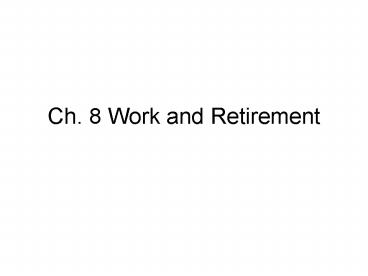Ch' 8 Work and Retirement
1 / 28
Title: Ch' 8 Work and Retirement
1
Ch. 8 Work and Retirement
2
Midterm Exam
- Chs. 5, 6, 7, 8 and corresponding lectures
3
Some questions on adult development and work
- How do careers develop?
- How does age influence job performance?
- How do jobs provide a context for other aspects
of development?
4
Hollands Theory of Vocational Choice
- Summarized in six statements
- 1. Six types of people
- Realistic
- Investigative
- Artistic
- Social
- Enterprising
- Conventional
5
- 2. People of the same personality tend to flock
together. - 3. People of the same personality type working
together in a job create a work environment that
fits their type. - 4. There are six types of work environments
- Realistic, Investigative, Artistic, Social,
Enterprising, Conventional
6
- 5.People who choose to work in an environment
similar to their personality type are more likely
to be successful and satisfied. - 6. How you act and feel at work depends to a
large extent on your workplace environment.
7
(No Transcript)
8
Enter self-efficacy (Hackett Betz,1981, 2006)
- Beliefs about our ability to successfully perform
a specific given task or behaviour - I think I can
9
Enter self-efficacy
- Beliefs about our ability to successfully perform
a specific given task or behaviour - Self efficacy is part of a persons type, but
is much more specific (Hackett Betz) - i.e., self efficacy directly influences
- Career interests
- Career goals
- Related actions
10
Information Sources
- 1. Performance Accomplishments
- 2. Vicarious Learning
- 3. Verbal Persuasion
- 4. Emotional Arousal
11
Career Barriers (e.g., Lent, Brown Hackett)
- Facets of environment that hinder career progress
at any stage - Career choice
- Implementing career choice
- Advancing through a career
12
Career Barriers (e.g., Lent, Brown Hackett)
- Proximal vs. Distal
13
Supers theory of occupational development
- Implementation
- Establishment
- Maintenance
- Deceleration
14
Age Work Peformance
- Cognitive decline?
- Expertise?
15
Success?
- Measured as
- Management span
- Salary level
- Job performance ratings
- Results Success depended on 3 things
- Years working at bank
- Tacit knowledge
- Years of education
16
Age Peformance The moral so far
- It depends
- How much demand does the job place on fluid
abilities? - How much demand does the job place on acquired
experience? - How much room is there for lifespan changes in
quality and quantity of work?
17
Do others think age is associated with declines
in work peformance?
- YES!
- Firing and layoffs target older workers
- Hiring decisions also reveal ageism
18
Ageist Hiring Practices(Bendick et al., 1999)
- Young testers and Older testers
- Trained in interviewing
- Applied for 102 jobs
19
Findings
- Pre-interview
- Younger applicant favoured 32 of the time
- Older applicant favoured NEVER
- Post-interview
- Younger applicant favoured 11 of the time
- Older applicant favoured 1 of the time
20
Findings (contd)
- Nine cases where both received an offer
- Almost equal
- When not equal younger got better salary and
better health benefits.
21
Retirementwhat do you think of?
22
Retirement
- Prior to 1900 retirement was for those with
enough land or resources to stop working - Many unemployed older workers who were living in
poverty - Age 65 chosen arbitrarilyfollowing Germanys
lead - Helps to solve the problem of unemployment among
younger workers
23
Recent Retirees Would Have Continued Paid Work if
- 33 Flexible work arrangements available
- 28 PT work available
- 26 Better Health
- 22 Increased Salary
- 12 No mandatory retirement
- 11 Other
- 7 Caregiving Arrangements Available
- (Schellenberg, 2004)
24
When do Cdns want to retire? (Novak, 1995)
- 40 before age 65
- 14 at age 65
- 1 after age 65
- 7 do not plan to retire at all
- 33 do not know
25
The early retirement decision
- Health
- Potential retirement income
26
Theories of Retirement Adjustment
- Crisis Theory
- retire and drop dead
- Continuity theory
- sufficient opportunities for satisfaction and
maintenance of the self remain - INDIVIDUAL DIFFERENCES!
27
Theories of Retirement Adjustment
- Stress or satisfaction
- Control (was retirement voluntary?)
- Minimize change (balance in life)
- Transitions should occur gradually
- Personal resources
28
Avg Hrs Spent Volunteering(Hall et al., 2001)





![⚡[PDF]✔ The Experience of Retirement](https://s3.amazonaws.com/images.powershow.com/10051459.th0.jpg?_=20240610122)

























